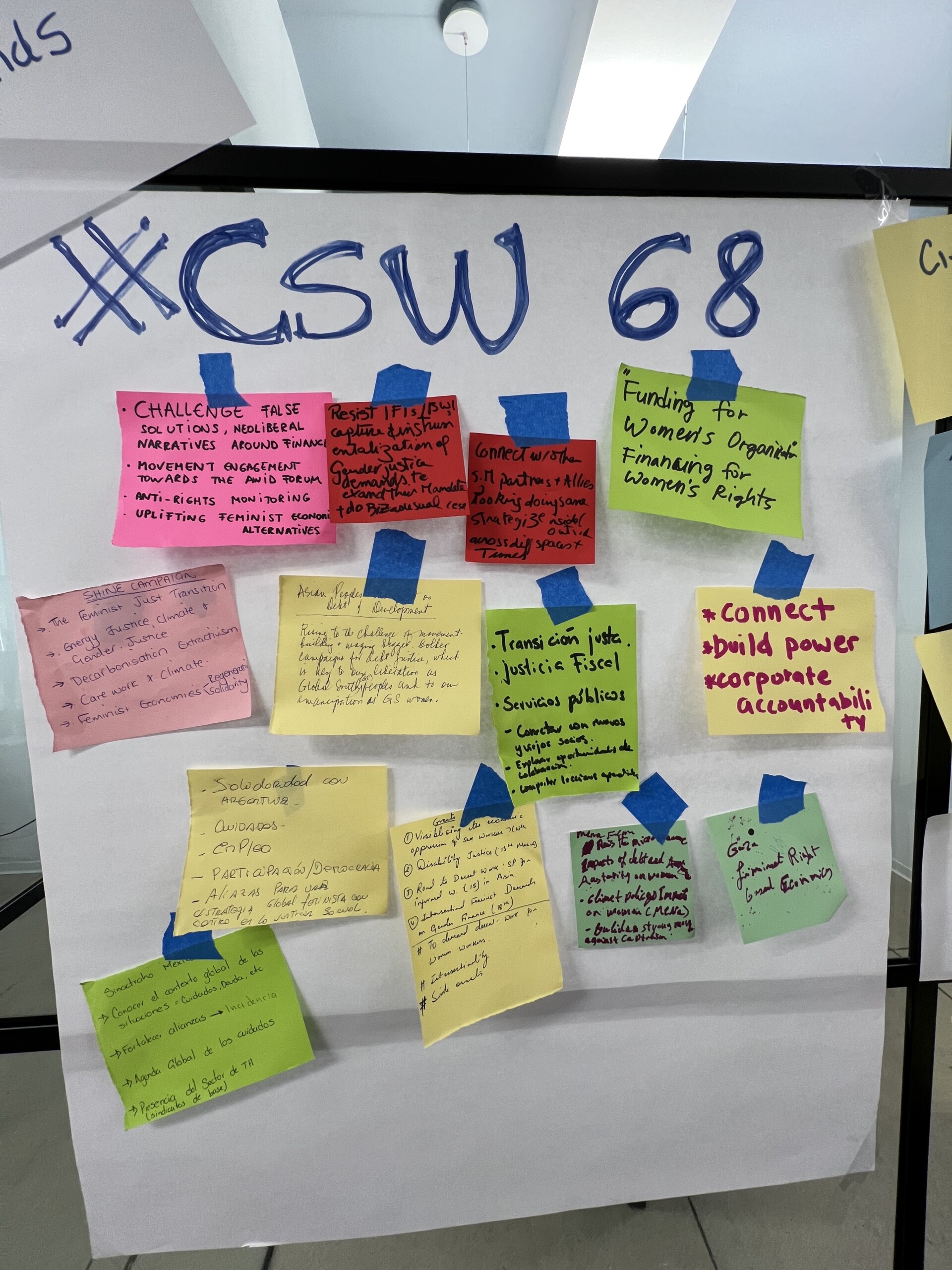It began with a welcome from co-host Pan African feminist activist Wangari Kinoti from Action Aid International followed by the participation of Vivi Restuviani from IWRAW Asia Pacific from Indonesia who shared perspectives from Asia on how corporate capture is manifesting in the region and provided a concrete case study from the region that shows the negative impacts facing communities, especially women and gender diverse groups); Kifaya Khraim from Women’s Center for Legal Aid and Counseling, Palestine referred to the context of conflict, specifically the documentation on Israeli settlements and forcible transfer of Palestinians; Maureen Olyaro, from FEMNET who informed about the irresponsible corporate behavior in trade policy-making based on their research looking at African Continental Free Trade Area (AfCFTA); and Claudia Lazzaro from SOCRA (Sindicato Obreros Curtidores de la República Argentina) and ESCR-Net member, who presented the challenges for the advancement of gender equality in the context of the current upsurge of corporate capture of the Argentinean state.
Claudia Lazzaro invited us to reflect from a historical perspective, recalling the corporate responsibility in crimes against humanity that took place in Argentina during the civil-military dictatorship (1976-1983). She said: ‘Corporate capture of the state in Argentina is nothing new, there are official reports that demonstrate the participation of companies in the repression, kidnapping and disappearance of workers. Investigations into companies such as Ford, Mercedes Benz and Molinos Río de la Plata began in the 1980s and even led to court rulings in 2002.’
In the framework of the 41st anniversary of the recovery of democracy in Argentina, several steps have been taken to identify and judge actors responsible for state terrorism. Lazzaro warns that there remains a need to politically position the growing corporate capture of the state and to uncover the effects of capture on the enforcement of human and environmental rights, and stresses the urgency of recording the forms of undue influence on national and international policy makers and public institutions.
She shared several examples of links between public officials and various cases of undue interference in the energy, industry, communications and health sectors. ‘It is no accident that neoliberal governments through the business lobby exploit workers, their bodies, their wellbeing and their health. There are officials in the public health sector who come from leading business groups in the health market who promote cuts in investment in public health, and condition unionized people in order to capture those workers who have social security in Argentina, which is key for health benefits for workers.
In her presentation Claudia called for women’s organizations and the feminist movement to join the global movement that calls for corporate accountability, denounces and documents manifestations of corporate capture that normalize state-corporate transactions, and warns of actions that promote the banishment of the gender equality agenda and wage a battle against the gains of the feminist movement.
She described the recent situation in Argentina where the new government denies the existence of the gender pay gap – although official statistics put it at 25% – and has downgraded the Ministry of Women, Gender and Diversity to a sub-secretariat, and recently announced measures banning inclusive language and everything related to the gender perspective. ‘It is urgent that this CSW 68, which calls for a redoubling of funding for gender equality policies, shows how this new public administration expresses itself in relation to the international commitments made by our states against violence against women. Today, those who should be defending peace and integration are promoting hate speech against women and sexual diversity, demonstrating against equal marriage laws, the law on access to safe and free abortion, and budget cuts in programme Acompañar –which seeks to strengthen the economic independence of women and LGBTI+ people in situations of gender-based violence – and the Alimentar programme – which provides economic support,’ denounced Claudia.
In the closing, the panelists highlighted that the challenges faced today in all contexts range from hunger, poverty, inequality, violence towards bodies and territories, the intersections between the climate, financial, economic, and care crises, the exploitation of natural resources, armed conflicts, public indebtedness and the dismantling of the public sphere and the erosion of democracies. This context makes it urgent that the response be collective, said Claudia. The women’s movement, the LGTBIQ groups and black women in Argentina are denouncing the wage gap, the feminization of poverty that has left women and diversities 30% poorer, employment programs for domestic workers have been closed leaving them without access to health and social security and where there are more than 43 thousand women and LGBT victims of violence waiting to be given the subsidy for assistance in cases of gender violence.
According to CELS reports, policies for the strengthening, assistance, and reparation of women and diversities have been dismantled: taking 43 care policies as a reference, 21 have already been dismantled due to repeal or complete under-execution, 15 policies are on alert due to inaction or lack of information, and only 7 policies remain in force.
Towards the end, Claudia proposes starting to talk about wealth, naming the economic elites that concentrate wealth in the world, and taxing the rich so that social and gender justice is effective and substantive. Our struggles must be collective struggles that do not disarm us. Just as we have said that our slogan is that the patriarchy will fall, for that to happen, there must be unity and promotion of Latin American and global action.






